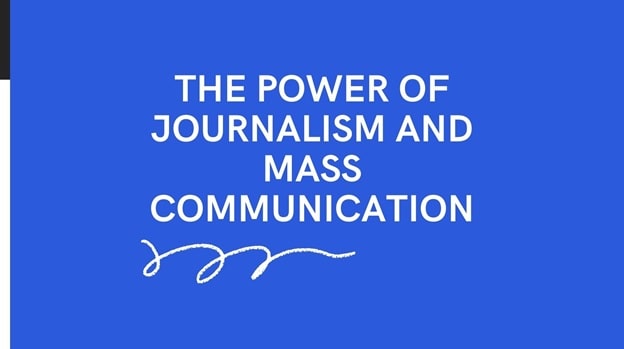Home » THE POWER OF JOURNALISM AND MASS COMMUNICATION

Introduction
In our fast-paced, interconnected world, journalism and mass communication play a pivotal role in shaping public opinion, influencing decision-making and disseminating information. These fields serve as the lifeblood of our democratic societies, fostering transparency, accountability, and social progress. In this blog, we will explore the significance of journalism and mass communication, their evolving nature, and their impact on our daily lives.
The Foundation of Democracy
Journalism is often referred to as the “Fourth Estate” in democratic societies, alongside the executive, legislative, and judicial branches of government. This designation underscores its vital role in checking the powers that be, holding them accountable, and ensuring transparency. Journalists act as watchdogs, uncovering corruption, investigating wrongdoing, and providing citizens with the information they need to make informed decisions.
Mass communication complements this by amplifying the reach of journalism. Through mass media channels such as newspapers, television, radio and the internet, important news and information can be disseminated to a wide audience. This ability to reach the masses is critical in educating citizens and promoting civic engagement.

The Evolving Landscape
The landscape of journalism and mass communication has undergone dramatic changes in recent years. Traditional media outlets have been joined by an array of digital platforms and social media channels, expanding the ways in which news and information are disseminated. This transformation has brought both opportunities and challenges.
Impact on Society
Journalism and mass communication have profound effects on society. Here are some of the key impacts:
Conclusion
Journalism and mass communication are pillars of modern society. They provide us with the information and knowledge we need to be active, informed citizens. While the landscape is evolving rapidly, their core mission remains the same: to provide truth, foster accountability, and drive positive social change. In our digital age, it is more important than ever to support credible journalism and be discerning consumers of information to ensure that these vital fields continue to serve the public interest.
From
Ms. Neha Arora
Assistant Professor
Department of Journalism and Mass Communication
Lingaya’s Vidyapeeth
REFERENCES
RECENT POSTS
CATEGORIES
TAGS
Agriculture Agriculture future AI Architecture artificial intelligence Bachelor of Commerce BA English BA Psychology BTech AIML BTech CSE BTech cybersecurity BTech Engineering Business management career Career-Specific Education career guide career option career scope Civil engineering commerce and management Computer Science Computer science engineering Data science degree education Engineering Engineering students English Literature english program Fashion Design Fashion design course Higher Education Journalism journalism and mass communication law Law career Machine Learning mathematics MBA MBA specialization Mechanical Engineering Pharmacy Psychology Research and Development students
Nachauli, Jasana Road, Faridabad, Haryana
Address: C-72, Second Floor, Shivalik, Near Malviya Nagar,
Above HDFC Bank, New Delhi 110017
Landline No. - 011-46570515 / 45138169 / 41755703
Mobile No. - +91-7303152412 / +91-7303152420 / +91-9311321952
Toll Free: 1800-120-4613
Mobile : 8447744303 | 8447744304 | 8447744306 | 8447744309
8700003974 | 8700003411 | 8700003749
Copyrights © 1998 - 2025 Lingaya's Vidyapeeth (Deemed To Be University). All rights reserved.
LV only conducts physical/online verification of any document related to examination on the following email id:
It is important to note that the following email IDs and domains are fraudulent and do not belong to our university.